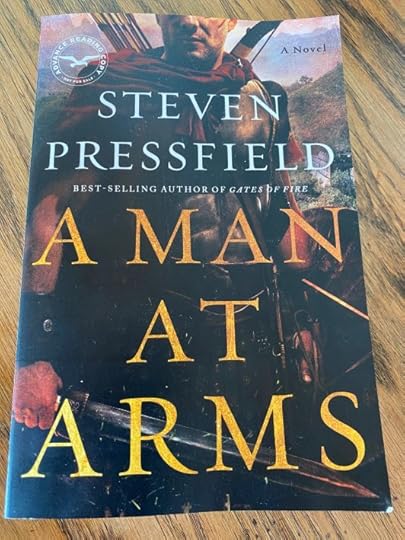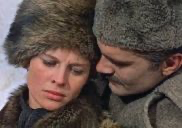Steven Pressfield's Blog, page 30
November 9, 2020
Episode Twenty-Five: The Western Way Of War
Today’s episode borrows heavily from Victor Davis Hanson’s book, The Western Way of War, whose thesis is that the way Alexander, Caesar, Napoleon, and all great Western generals down to today chose to wage war was to seek a pitched, decisive infantry battle that, at one blow, would decide everything.
Where did this idea come from?
From the ancient Greeks.
The post Episode Twenty-Five: The Western Way Of War first appeared on Steven Pressfield.
November 5, 2020
Episode Twenty-Four: Heroes And Villains
If history is written by the (ultimate) winners, it’s no wonder that we in the West view the Persian king Xerxes as a villain and the Spartan king Leonidas as a hero.
But the warriors of the East were men of honor too, trained “to draw the bow and speak the truth.”
Let’s investigate the Warrior Archetype today for how it regards enemies … and why we in the West value certain styles of combat over others.
The post Episode Twenty-Four: Heroes And Villains first appeared on Steven Pressfield.
November 4, 2020
The Idea for “A Man at Arms”
Readers ask me sometimes if there’s any individual character among all those I’ve written with whom I identify most.
There is.
It’s the solitary mercenary of the ancient world, Telamon of Arcadia, who appears in the fourth century BCE in Tides of War, re-appears unchanged sixty years later in The Virtues of War, and even makes a cameo in The Profession (still unchanged) twenty years into our contemporary future.
 Coming March 2021
Coming March 2021For years friends have asked me, “When are you going to do a book just about Telamon?”
I’ve wanted to. I can’t tell you how many outlines I’ve started or concepts I’ve scratched onto yellow foolscap pads.
But I never could find the right story or the proper time period.
How could I bring this dark, haunted, indeed doomed character out of the shadows and into a possible resolution to his fate?
Then one day, about three years ago, I began thinking about another character–a nine-year-old mute girl, in the first century CE, tasked with delivering a certain letter to a certain beleaguered community.
I thought, “This is the story. It’s not about just him. It’s about him and her.”
Remember, a couple of months back, we did a series of posts in this space whose theme was
Get to “I love you?”
The idea of “Get to I Love You” is to take two characters who are as far apart as possible at the start of story … then structure the narrative in such a way that, by the end, they have come together.
The two characters don’t have to be lovers.
They can be a father and a daughter.
A child and a wild animal.
A cop and a gangster.
The dynamic can happen even within a single character.
This new book is called A Man at Arms. It comes out in March 2021.
What made it work as a story, what gave me the confidence to write it, is this idea of
Get to “I love you.”
How could I crack open the skull of Telamon, the one-man killing machine whose philosophy is essentially to believe in nothing?
The answer (unless I’m crazy) was to set across from him an innocent child who believes in everything … and make the man and the girl, somehow, come together in the end.
The post The Idea for "A Man at Arms" first appeared on Steven Pressfield.
November 2, 2020
Episode Twenty-Three: The Inner Battle
This episode was not in our schedule.
We stumbled upon the cottage you’ll see behind me in the video.
It prompted me to recall an “inner war” that changed my life years ago, beneath a red-tile roof just like this one.
The post Episode Twenty-Three: The Inner Battle first appeared on Steven Pressfield.
October 29, 2020
Episode Twenty-Two: “for We’ll All Be Sharing Dinner in Hell.”
Spartan men (and women) were encouraged from an early age to develop a very specific style of humor–short, punchy quips, often with a dark fatalistic bite.
In today’s episode, we’ll examine two examples, both true-historical and both from Thermopylae.
Let’s see if we can figure out why this style of humor perfectly fit warriors about to undergo a trial of death.
The post Episode Twenty-Two: "for We'll All Be Sharing Dinner in Hell." first appeared on Steven Pressfield.
October 28, 2020
Alone in a Room, Wearing a Mask
The following is from an interview with the writer and director Paul Schrader (“Taxi Driver,” “Raging Bull,” “Light Sleeper,” “First Reformed”) from the L.A. Times, September 13, 2020.
“ … over the years I’ve developed my own little genre of films. And they usually involve a man alone in a room, wearing a mask, and the mask is his occupation. So it could be a taxi driver, a drug dealer, a gigolo, a reverend, whatever. And I take that character and run it alongside a larger problem, personal or social. It could be debilitating loneliness like in ‘Taxi Driver.’ It could be an environmental crisis like in ‘First Reformed.’
 Julie Christie and Omar Sharif in “Dr. Zhivago”
Julie Christie and Omar Sharif in “Dr. Zhivago”“I’m looking for deep-seated problems, either personal or societal, and some kind of oddball metaphor. The more you get closer, you run these two wires next to each other, the more sparks you see flying across. And it’s in the sparks that the viewer comes alive. If the wires ever touch, there’s nothing left for the viewer to do. But if you keep these two wires really close to each other, the viewer will start to spark from one wire to the other. And that’s the greatest thing you can give a viewer or a reader, an opportunity to be part of the creation.”
I love analogies like this because they really help me as a writer.
When Mr. Schrader says “a man alone in a room with a mask on,” that strikes me as a different way of saying “get to true identity.”
“Man” of course means man or woman.
“In a room” means a contained dramatic environment.
“Mask” is false identity.
The story’s job is to get the mask off and reveal the hero’s true identity.
But I love the second part of Mr. Schrader’s construct even more—the idea of the “two wires”—the character’s story running side-by-side with a greater story but never quite touching.
I started thinking about Dr. Zhivago (even though it wasn’t written by Mr. Schrader but by Boris Pasternak, the novel, and Robert Bolt, the screenplay.)
The man in the mask is Yuri—Dr. Zhivago (Omar Sharif).
The room is Russia in the time of the revolution.
Yuri’s true identity (mask off) is that of a great poet, whose works and depth of sensibility transcend temporal upheavals, however monumental or Earth-altering.
The parallel societal problem is the White-Red clash that ended with the victory of the Communists and their idealistic, well-intentioned but in the end soul-destroying totalitarian worldview.
The central scene to me, if you recall it, is when Zhivago, seeking to flee with his family to their dacha in the countryside, is snatched up and dragooned by Red Army partisans under their ruthless commander Strelnikov (Tom Courtenay), whom Zhivago had known briefly in pre-revolutionary days as the unhappy student radical Pasha Antipov (who became briefly the husband of Lara [Julie Christie], whom Zhivago would come to love as well and for whom his greatest poetry would be written.)
The scene between Zhivago and Strelnikov takes place on Strelnikov’s armored high-speed train. It’s an interview, face to face, in Strelnikov’s office/cabin. The two men speak briefly of Zhivago’s poetry, which Strelnikov dismisses, not with contempt or ill will but simply as out of phase with the times.
STRELNIKOV
I should find it absurdly personal.
Zhivago is stung and even unnerved by this appraisal. To him, the personal is everything. Love. Depth of emotion. The imperatives of the heart.
STRELNIKOV
The personal life is dead in Russia. History has killed it.
See the sparks?
Paul Schrader is right. When you set a greater issue in parallel with a unique personal one, particularly one that involves the hero seeking his or her true identity, you get drama and magic and insight.
Zhivago’s life-odyssey (and his poetry) is a testament to the permanence of the personal … of love and of feeling … over the transience of “greater” political events, even if these produce massive societal transformation that, in truth, could not have been brought about in any other way.
Zhivago collapses and dies at the end of the story, post-revolution, dismounting from a streetcar in a moment of frantic passion, after spotting his great love, Lara, on the street and pursuing her as she walks past without seeing him.
YEVGRAV ZHIVAGO (ALEC GUINNESS)
The walls of his heart were like paper.
The story ends with the triumph of Communism and the conclusion (justifiably true) that such a brutal and heart-annulling mass movement was necessary to awaken Russia and bring her into the modern world. The final scene takes place in the control room overlooking a massive hydropower dam—a feat of engineering and construction that pre-revolutionary Russia could never have even dreamt of.
But who “won?”
In the end it is Zhivago’s poetry, speaking to the timeless Russian soul, that remains vivid and ineradicable, ever-alive in the hearts of the people.
Paul Schrader’s concept holds true.
Sparks did fly between these two parallels, didn’t they?
The post Alone in a Room, Wearing a Mask first appeared on Steven Pressfield.
October 26, 2020
Episode Twenty-One: The Hot Gates
In today’s episode, we’ll get into the tactical blood-and-guts scenario of the battle of Thermopylae … three days of “hell in a very small place.”
The post Episode Twenty-One: The Hot Gates first appeared on Steven Pressfield.
October 22, 2020
Episode Twenty: The Amazons, Part Two
The legend is that, around 1250 BCE, an army of Amazon women attacked Athens.
Plutarch, who lived in the first century CE, tells us that in his time at Athens there were still graves of warrior women, temples dedicated to them, and a neighborhood called Amazoneum.
I’m a believer. Are you?
The post Episode Twenty: The Amazons, Part Two first appeared on Steven Pressfield.
October 21, 2020
Alexander the Great and the Two Levels
I felt at home in Egypt. I could happily have been a priest. In truth I am a warrior-priest, who marches where God directs him, in the service of Necessity and Fate. Nor is such a notion vain or self-infatuated. Consider: Persia’s time has passed. In the Invisible World, Darius’ empire has already fallen. Who am I, except the agent of that end, which already exists in the Other World and at whose birth I assist in this one?
This passage is from The Virtues of War, spoken by Alexander (or my imagined version of him.)
 Colin Farrell in Oliver Stone’s “Alexander”
Colin Farrell in Oliver Stone’s “Alexander”What has always fascinated me about the character of Alexander the Great is that he seemed to see the future with such clarity (and such conviction) as to not only make others see it and believe in it as powerfully as he did, but also to make it virtually impossible that that future would not come true—and that he would be the one to make it do so.
Did Alexander really overthrow the Persian Empire against all odds and in the face of history? Or was that chapter nearing its close … and he perceived this and acted to turn the page?
That’s you and me at the inception of a creative project.
The book/screenplay/non-profit/startup already exists in the Other World.
Your job and mine is to see it, to believe in it, and to bring it forth in this one.
The post Alexander the Great and the Two Levels first appeared on Steven Pressfield.
October 19, 2020
Episode Nineteen: “Women The Equal Of Men”
We’ve all seen “Wonder Woman” and thought it was cool.
But was there really a race of warrior women?
Did they really sear off the right breast so the arm would grow strong to draw the bow and sling the double-bladed axe?
Were the Amazons really the greatest force on horseback ever?
Did they actually attack Athens … and nearly win?
The post Episode Nineteen: "Women The Equal Of Men" first appeared on Steven Pressfield.



